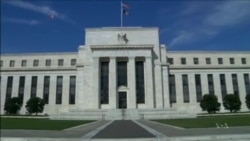With worries over China’s slowing economy starting to recede - financial markets are beginning to shift their collective attention to U.S. monetary policy - specifically, interest rates. The Federal Reserve has kept its benchmark interest rates at record lows to boost growth during the recession. Given the slow but steady improvement in the U.S. economy, analysts say the question is not whether interest rates will rise, but when.
Until the recent stock turmoil triggered by the slowdown in China, many expected a September rate hike. But uncertainty over global economic growth muddied the waters. Even job numbers showing U.S. unemployment at a seven-year low have not eased concerns, says Bankrate.com’s Mark Hamrick, who spoke to VOA via Skype.
“This August jobs report neither flashes a green light for the Federal Reserve to raise interest rates, nor does it flash a red light. Meaning, that it is still in this caution zone,” Hamrick said.
The caution reflects the Fed’s dual mandate - full employment and stable prices. Hiking rates too soon could spark deflation and its ripple effects says Joseph Minarik, head of research at the Committee for Economic Development.
“If the Federal Reserve raises interest rates too quickly and too much and deters demand, particularly for major purchases in the economy, the result can be a cascading reduction – starting with consumer demand – going on to employment,” Minarik said.
IMF urges delay
The International Monetary Fund urges the Fed to wait until at least next year.
Spokesperson William Murray says the IMF believes “the Federal Reserve can afford to hold interest rates low until there are more tangible signs of wage or price inflation."
But delay also carries risks. Among them - few policy options when the U.S. economy hits another downturn says Joe Brusuelas, chief economist at financial consulting firm McGladrey.
“The Fed needs, before this business cycle ends, to get the Federal Funds rate somewhere at or above 200 basis points (2 percent), so when the inevitable recession comes, they can have firepower.”
But the Fed is keeping all options open. That's a worry for a market that likes certainty, says Maria Fiorini Ramirez at consulting firm MFR.
“We’ve all been on pins and needles in terms of when they’re going to do it," she said. "So either they should say that because of weaker growth and all the other reasons that they eloquently discuss, say that 'we’re not going to do anything' or just do it and say: 'this is it for now.' ”
Anyone seeking clarity will have to wait. No announcement is expected until after members of the Federal Open Market Committee meet September 16 and 17.





